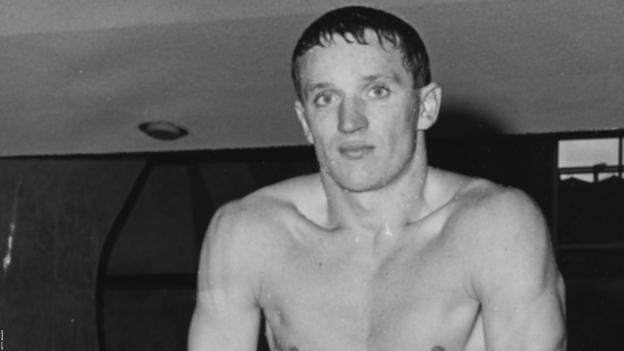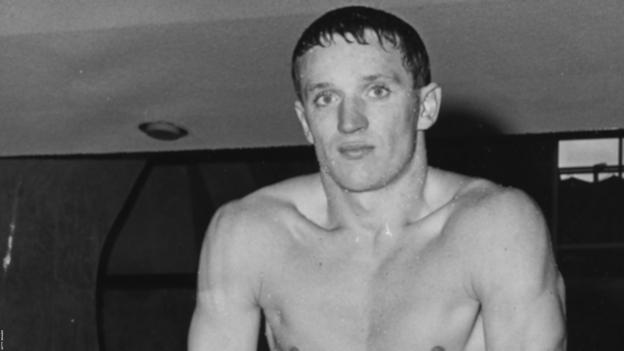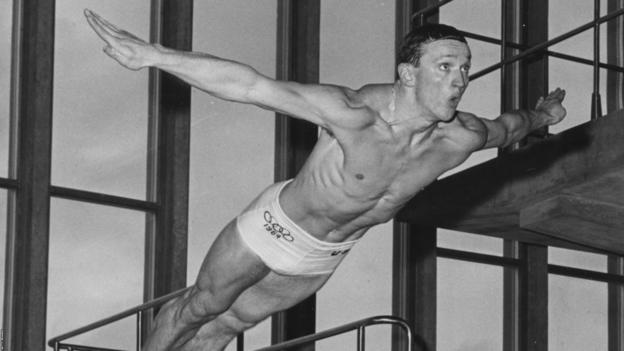Gymnastics historical sex abuse case: Survivor claims ‘catastrophic failures’
A survivor of historical child sexual abuse involving former trampoline coach Brian Phelps accuses British Gymnastics of “catastrophic failures”. …


Warning: This article contains references to rape and sexual abuse
A survivor of historical child sexual abuse at the hands of a former trampoline coach has accused British Gymnastics of “catastrophic failures” in what she claims is the biggest case of sexual abuse in the governing body’s history.
Olympic diver Brian Phelps, who won a 1960 bronze medal at the Rome Olympics as a teenager, became a trampolining coach at a gymnastics club after his career finished. But he was later jailed in 2008, aged 64, after admitting a string of indecent assaults against three children.
Phelps – who also won gold at the 1962 and 1966 Commonwealth Games – served six years of a nine-year jail sentence.
However, ‘Emma’ – whose name the BBC has changed to protect her identity – claims there are at least 12 further victims, including herself.
Speaking to BBC Sport, Emma revealed how – in the mid-1970s – from the age of five, she was raped and molested by Phelps at the trampolining gym he ran with his wife Monica.
The British Gymnastics affiliated gym then moved to a new premises in Poole, Dorset, and was renamed ‘Olga’. Emma says the abuse continued in a basement room.
She said: “They called the basement ‘Happyland’. There were Disney characters painted on the walls there, including the characters from Snow White and the Seven Dwarfs.”
“Horrific things [happened here], every element of the worst that can happen to a little girl when they’re in the hands of a paedophile. I think a little part of your soul, when something that brutal happens, breaks off.”
Emma told police of her abuse in the early 90s when suffering from anorexia, but didn’t feel strong enough to press charges. But she said the recent exposure of mistreatment in the sport, plus the Whyte Review investigation of “systemic” physical and emotional abuse in gymnastics, made her feel “empowered” to speak out.
She is in touch with lawyers and considering legal action to compel British Gymnastics to compensate her for years of therapy, plus fund a centre for abuse survivors.
Emma added: “There were catastrophic failures across multiple institutions that contributed to what happened to us – at county level, obviously British Gymnastics, everyone else who should have been regulating what was happening at the time.
“It’s now about redirecting the deep, deep shame that exists in ourselves as trauma survivors back into where it belongs – which is everyone who was complicit in all of the things that happened to us.”
British Gymnastics told the BBC it is “truly sorry for any abuse that has taken place in the sport” and said Emma has received extensive one-to-one support from its safeguarding team over several months.
It added: “Our Reform ’25 action plan clearly sets out how we have learnt from the past- including working with survivors to develop restorative support in the next two years.”
Phelps told the BBC he “absolutely denies all allegations” made against him by ‘Emma’ and said he did not even enter the basement. He said that in 2008, the child protection team sought out “lots of children who were closely associated with me though sport, looking for victims who had ‘slipped through the net’ – with zero response”.
What is the background?

Emma was 12 when she told her parents she couldn’t keep going to the Phelps’ Olga gym. But it wasn’t until 2008, when Phelps admitted 42 counts of historical indecent assault and gross indecency against three children aged between six and 15, that she realised she wasn’t his only victim. He was put on the sex offenders register for life. Phelps was also charged with rape and attempted rape, but denied it.
Venerated as an Olympian, a charge of exposing himself to a child was dropped just weeks before he won double gold at the 1966 Commonwealth Games.
In 1979, he was a finalist in the BBC’s hit show Superstars. More accusations were made about Phelps’ conduct in the ’90s but no action was taken. It wasn’t until three women came forward in 2003 that he was suspended from British Gymnastics the following year, and eventually sentenced four years later.
Despite the association with a convicted paedophile, the Olga gym brand has continued to operate in the Poole area, with a second venue opening in 2016 – both run by Everyone Active, in association with Bournemouth, Christchurch and Poole Council.
“What was it like to know that it was still going? Horrific,” says Emma. “What was it like to see them then expanding it? Brutal. It felt like they kept alive the celebrity element of the brand and just buried the horrible part – that’s really hurt.”
BCP Council and Everyone Active told the BBC that, with help from British Gymnastics, they are now in the process of changing the name, the uniforms and branding.
In a joint statement they said: “Olga Poole has a long legacy, but also a history which continues to have an adverse resonance for some of its former members many years later. We fully understand the impact that the continued use of the original name would have.
“We do not underestimate the seriousness of the situation and are working closely with everyone involved to make the transition to the new name as smooth as possible.”
“There’s nothing historical about Olga for us” says Emma. “People have no idea the long-term effects of childhood sexual abuse and the other things that were happening within gymnastics – the way we were just taught to ignore pain and suffering and just take it on the chin and suck it up.
“Putting it all together, that completely alters the trajectory of our lives.”
The Whyte Review, co-commissioned by UK Sport and Sport England, was released in June 2022 and found gymnast wellbeing and welfare “has not been at the centre of British Gymnastics’ culture”.
The review said the difficulties now facing British Gymnastics, the sport’s national governing body, are “borne of inadequate practice and procedure”, and reflect a culture which was the product of “the way in which people behaved and were allowed to behave”.
If you have been affected by issues raised in this article, there is information and support available on BBC Action Line.




